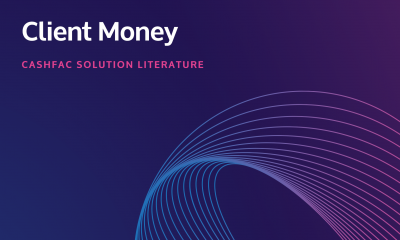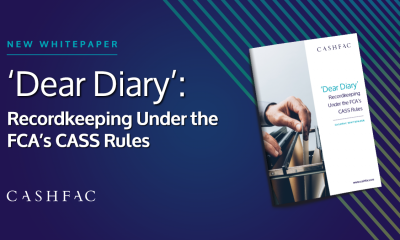5 Takeaways from the FCA’s latest “Dear CEO” letter on Client Money (CASS 5) for Insurance Intermediaries
In response to the FCA’s latest “Dear CEO” letter to Insurance Intermediaries working with client money, James McGivern, Head of NBFI at Cashfac evaluates the 5 areas of responsibility for Senior Managers.
I am old enough to remember when “Dear CEO” letters were a rarity. Now they seem to appear more and more frequently. The latest letter, published on 30th September 2020, entitled “Adequate Client Money Arrangements – For General Insurance Intermediaries” is possibly the most interesting FCA letter of the year… so far. The regulator has not tried to upgrade the CASS 5 regulations since the old FSA failed to get the Consultation Paper 12/20 through, eight years ago. Could this latest letter be trying to upgrade the CASS practices of the insurance industry almost surreptitiously?
The letter, like several of the earlier ones this year, is driven by concerns about the impact of COVID-19 and it seems to have taken the FCA a little longer to raise concerns about the insurance industry than with the asset management and e-money institutions. We must indeed be, as the Chinese say, cursed to live in interesting times.
The FCA’s letter reminds the insurance industry that there is really only one great commandment in Client Money regulation: that the Senior Managers of regulated firms are responsible for ensuring Client Money is 100% protected.
5 Areas of Responsibility for Senior Managers
The regulator outlined 5 areas of responsibility for Senior Managers to focus on:
- Application of client money rules to firm’s business model. This is never as simple as it sounds. All that is required is for you to know your business’s cash operations process end-to-end, including every nook and cranny. (Hint: It is easier if you use double entry accounting to fully record all cash movements and all cash positions rather than a raft of corruptible spreadsheets). You then need to apply the principles of client money protection to this process and, of course, you need to document that and ensure that the right legal agreements and terms and conditions are in place. This is especially important when you are using any method of client money protection other than a statutory trust.
- Adequacy of governance and oversight. This too is one to be careful of. What is adequate governance in times of low risk may not be good enough now. Technology can really help here. Automated real-time management and risk reporting is now easily achievable. Accounting and reconciliation of cash and accrued positions is achievable on a realtime basis with integrated modern technology platforms like Cashfac.
- Oversight of third parties, including due diligence. This applies to deposit takers and appointed representatives of regulated firms. It is important to review their resilience to protect your own firm, but you must also ensure that they can keep your client’s money safe as well. As deposit takers in non-UK countries may not offer trust protection of clients’ money, It is hugely important that this risk is strongly addressed in these uncertain times.
- Client money calculations and reconciliations. Anything less than daily reconciliation in a firm with any significant trading volume is inadequate to protect Client Money. In fact, these reconciliations can now be easily done on an intra-day basis with the right automated systems.
- Bank acknowledgement letters for all client money accounts. Your firm needs to make sure that all its client money bank accounts have “trust” letters in place from the issuing bank that confirms the account’s status. It is the easiest thing in the world to forget to complete this process for a new account. Unfortunately, it is even easier for the FCA inspector to discover this and fine your firm heavily.
In conclusion the FCA says it will expect firms to act in response to this letter and it will be hastily checking what your firm has done.
The regulated firm’s board or subcommittee responsible for CASS oversight would be well advised then to meet this month and ensure that a CASS review is initiated, completed promptly, and is thoroughly documented. It might even be money well spent to have a short external audit or inspection completed to ensure all is in order. Finally, if this is the new normal, it may be time to upgrade your firm’s approach and perhaps increase the robustness of your cash operations process through better automation and the use of newer Open Banking-based solutions.
CASS protection is never optional but is only really needed when there is heightened risk of business failure. COVID-19 has clearly greatly increased that risk for even the strongest of businesses, either directly due to decreased activity or as a knock-on effect of business partners and agents failing. If the industry is to survive this and recover quickly from it, then now is the time to make your CASS 5 processes iron-clad and liquidation-ready. Yes, I know it will never happen. It does not matter, liquidation-ready is the required standard for the well governed and compliant firm these days.
Join our Upcoming Webinar
We have partnered with Lloyds Banking Group and PKF Littlejohn to host a webinar at 10:30 on Thursday 10th November 2020 on the management of client money in Insurance, given the industry’s heightened regulatory requirements. For more details, visit our registration page.
Get in Touch
If you’d like to get in touch with me or hear more about how we at Cashfac help Insurance Intermediaries working with client money, fill out the short form below.


